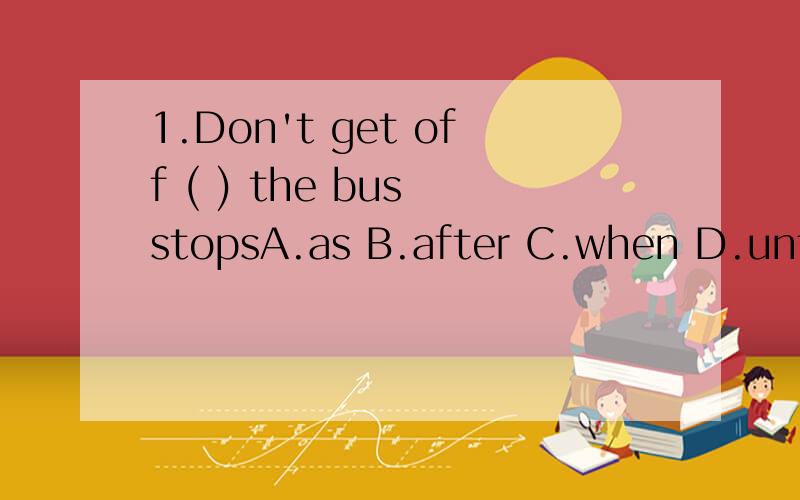1.Don't get off ( ) the bus stopsA.as B.after C.when D.until2.I think it can be ( ) played ( ) eaten.You'd better throw it awayA.both,and B.either,or C.neither,nor D.not only,but also
来源:学生作业帮助网 编辑:作业帮 时间:2024/11/30 11:34:40

1.Don't get off ( ) the bus stopsA.as B.after C.when D.until2.I think it can be ( ) played ( ) eaten.You'd better throw it awayA.both,and B.either,or C.neither,nor D.not only,but also
1.Don't get off ( ) the bus stops
A.as B.after C.when D.until
2.I think it can be ( ) played ( ) eaten.You'd better throw it away
A.both,and B.either,or C.neither,nor D.not only,but also
1.Don't get off ( ) the bus stopsA.as B.after C.when D.until2.I think it can be ( ) played ( ) eaten.You'd better throw it awayA.both,and B.either,or C.neither,nor D.not only,but also
1、D get off 下车 not···until 直到···才···
汽车没停下就不能下车,即直到汽车停下而来才下车.
2、C neither···nor 既不···也不
我认为这既不能用也不能吃,你应该把它扔掉.
1 D 不要瞎扯直到公交到站
2 B 既不也不
D。 在汽车停之前不要下车。 不要下车,直到 汽车停止。
C。 不能玩,也不能吃
请尊重答题的人。看完后,请标示你选择的答案。
1 D 直到车停了再下车,
2 C 既不能吃也不能玩
1.D 2.C
1. D 在车停下之前不要下车。
as 是随着, after是之后,when是当..时候。
这句是主要考until的用法。
1)主句动词如果是延续性的,用肯定句,意为:一直到
I will wait here until you come back.wait是延续的,所以用了肯定句,译为:我会等在这里,直到你回来。或我会在这里一直等到你回来。
2)主句动词如...
全部展开
1. D 在车停下之前不要下车。
as 是随着, after是之后,when是当..时候。
这句是主要考until的用法。
1)主句动词如果是延续性的,用肯定句,意为:一直到
I will wait here until you come back.wait是延续的,所以用了肯定句,译为:我会等在这里,直到你回来。或我会在这里一直等到你回来。
2)主句动词如果不延续,那就用否定句,译A不..B就不;在B...之前,A不...
I won't start until you come back.你不回来,我不会开始的。你回来之前我不会开始的。
get off是非延续动词,用了否定句,所以后面搭配until.
2. C 我觉得它既不能玩也不能吃,你最好把它扔了。
both A and B, A和B都 I like both you and your friends.
either A or B, 两者任意之一均可,用于肯定句
You can either wait here or go with me.你可以等在这儿,也可与我一起去。
neither A nor B, 与上相反,是两者任意之一都不...
I neither know him nor want to know him.
我既不认识他,也不想认识他。
not only, but also.不仅,而且。
I not only like basketball, but also play it well.
我不仅喜欢篮球,而且打得也很好。
这句话有否定含义,所以选neither nor
另外:要注意:either or, neither nor,如果连名词作主语,要执行就近原则。
如:Neither my teacher nor my classmates like the idea.
Neither you or he knows the truth.
either, neither单独做主语,皆用单数。
Neither of the answers is righ.两个答案中没有一个是对的。
Either of them is ok with me. 两个里的任意一个对我来讲都可以。
收起